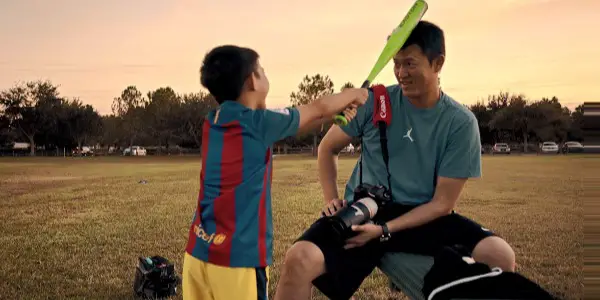LATE LIFE: THE CHIEN-MING WANG STORY: What Happens To Professional Athletes In Late Life?

Frank H. Wu is William L. Prosser Distinguished Professor at…
It must be awful to peak early as professional athletes typically do. In most careers, you have at least the possibility of progress until and even beyond senior citizen status, and a thirty year old is not considered “over the hill.” For baseball pitcher Chien-Ming Wang, it was a freak injury that cut short his days not only in America and the major leagues but with none other than the storied New York Yankees.
In Late Life: The Chien-Ming Wang Story, a documentary by Frank W. Chen, his attempted comeback, which may still be going on, is depicted with the utmost sympathy. He simply refuses to retire.
How Do You Make It in the Big Leagues?
The six-foot-four-inch Wang arrived in America from Taiwan to be a baseball pitcher. He became an ace on the strength of his sinker, a type of pitch so sophisticated that scientists are still trying to determine if it, like the more widespread curveball, is an optical illusion or actual movement — the title of the movie refers to the late “break” of the baseball.

Wang’s best seasons were back to back, in 2006 and 2007, when he won nineteen games each year, stats not common in the era of the allegedly “juiced” ball favoring homerun sluggers. He led the American League in wins once, started on the mound in the inaugural game of the new Yankee Stadium, and earned a World Series ring as well, accomplishments that are the stuff of fan fantasies.
But then in 2008, he hurt his foot while running the bases in inter-league play against Houston, since the National League does not allow designated hitters in lieu of the pitcher taking a turn in the lineup. That was it. Although the incident wouldn’t seem to be so serious and the exact nature of damage is obscure, he never regained the same form. He subsequently damaged the shoulder of his throwing arm. From the combination of ailments, his delivery became compromised.
Trying his luck as a free agent in the minor leagues, Wang is depicted as an ordinary guy. He drives his own car. He pumps his own gas. He is lonely. He is homesick.
In Late Life, he spends time under the tutelage of experts on a Texas pitching “farm.” They analyze every aspect of his mechanics. They have him heaving medicine balls on site and while in budget hotel rooms, seemingly without ever stopping. Everyone is aware that time is working against them. Few clubs will want to gamble on a player beset by incurable ailments who is, as we all are, older by the day. The Kansas City Royals employed Wang briefly, granting the makers of this movie the semblance of a Hollywood ending.
How Do You “Represent”?
A good portion of the story is the explicit portrayal of Wang as local hero. He is “the pride of Taiwan.” The entire island roots for him. They are renowned for Little League dominance based on discipline and teamwork. A few professionals from there have made it to the big leagues. Like their Japanese emigre peers, they cannot avoid being representatives, racially and ethnically, and generally in a positive sense on both sides of the Pacific Ocean.

Another part of the narrative is more subtle. It is the assimilation of Wang. The scenes of him hitting the road, warming up in the bullpen, worrying about being cut from the roster as he boards the bus, and so on, could feature any other protagonist in any other account of the American pastime. The late Mark “the Bird” Fidrych, subject of his own documentary, captivated the nation as a rookie during the Bicentennial, coincidentally winning nineteen games, before suffering a torn rotator cuff and struggling for a few years before giving up for good.
The fictional Roy Hobbs (Robert Redford) in The Natural is an archetype as an aging athlete making the most of an unexpected second chance. Field of Dreams introduced a meme to popular culture — “if you build it, he/they will come” — in its family-friendly magic realism of an Iowa farmer (Kevin Costner) who hears the voice of a reclusive author telling him to construct a baseball diamond in his cornfield, in order to reconcile with his dead father. Bull Durham likewise presents an older jock (Kevin Costner again) redeemed by romance and an avuncular role guiding the newest phenom.
Yet Wang’s home life would be recognizable to any Asian immigrant family, right down to the slippers inside the door. The difference is that his son, who is the focus of the opening scene, has to explain at school that his dad really is — or was — a superstar athlete. Wang was reluctant to cooperate on the movie, but the appeal to inspire the next generation persuaded him.

Director Chen makes his debut here. The producer, Brian Yang, also brought out Linsanity, the biopic about basketball sensation Jeremy Lin. Their movie has high production values but is a bit slack in pacing; it would work as effectively if it a dozen minutes were edited out. The leisurely flow, however, sets the mood, which is elegiac. There is an earnest digression to the home museum of a memorabilia collector. The banter there about the good ‘ole days is like any reminiscence about competitive glory gone by.
Conclusion: Late Life
You don’t need to be a baseball enthusiast to enjoy Late Life. Anyone who appreciates human drama will be rooting for Wang. At the end, a viewer can hope with him that he will have another opportunity to show his stuff. He has already demonstrated the necessary dedication. But perhaps the moral is that we deserve better from the universe. We can only keep trying.
When should you finally call it a day, if you are sure you were denied what was due?
Late Life: The Chien-Ming Wang Story premiered at the Los Angeles Asian Pacific Film Festival on May 9, 2018, and also played at the San Francisco CAAM Fest on May 12, 2018. It will be released in Taiwan this fall; a North American release date is to be announced. The reviewer was a documentary division judge for CAAM Fest.
Does content like this matter to you?
Become a Member and support film journalism. Unlock access to all of Film Inquiry`s great articles. Join a community of like-minded readers who are passionate about cinema - get access to our private members Network, give back to independent filmmakers, and more.
Frank H. Wu is William L. Prosser Distinguished Professor at University of California Hastings College of the Law, where he has taught on film and law; he previously served as Chancellor & Dean at the institution. He has been published everywhere from the New York Times and Washington Post to the Chronicle of Higher Education and National Law Journal to Huffington Post, and he writes regularly about photography for 35mmc. He is a fan especially of 1970s paranoid thrillers.












